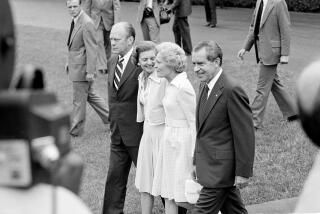Response to Robertson’s Plea to End Arts Funding Is Mixed : Endowment: Other religious leaders take a more moderate approach to pornography and freedom-of-expression issues.
Television broadcaster Pat Robertson’s call this week for the end of federal funding of the National Endowment for the Arts is not being followed en masse by other religious leaders.
Although some religious groups support bans that would prohibit the publicly funded endowment from spending federal money on what they consider obscene and pornographic art, few favor outright bans.
“We do not oppose NEA funding,” said Robert Dugan, a spokesman for the National Assn. of Evangelicals, which represents about 55,000 churches and more than 44 denominations. “We would not go that far.”
However, echoing the sentiments of some other religious leaders, he quickly added: “We do not think that taxpayers should be forced to fund salacious and sacrilegious art.”
Some religious organizations are torn between fundamental beliefs against pornography and obscenity and a desire to protect freedom of speech and expression, on which they are dependent.
“The Jewish community has always been protective of freedom of speech and is very wary of censorship of any kind,” said Rabbi Moshe Rothblum, past president of the Jewish Federation Council of Greater Los Angeles’ Board of Rabbis. “When you start tinkering with freedom, whether it is artistic or religious freedom, it can be very dangerous.”
But some are willing to join Robertson’s cause.
“We think the full amount of money that now goes to the NEA should go to more worthy projects like famine relief,” said Dennis Jerrard, chairman of the Roman Catholic Archdiocese of Los Angeles’ Commission on Obscenity and Pornography. “There is some feeling out there that the entire NEA should just be abolished and that that would solve the whole problem.”
Most religious denominations have historically been hesitant to take stands that would blur the line between church and state, said John Crossley, a USC religion professor.
“Regardless of the morality of something, there is a notion that religion should not be capable of dictating to the state,” Crossley said. “Unless there is overwhelming demonstrated evidence that allowing something to continue will have a horrendous effect on the whole body politic then the feeling has always been to stay out.”
While there is no consensus among religious groups, any perceived push by the religious community could help bolster one side of a growing national debate.
Lawmakers, including Rep. Paul B. Henry (R-Mich.), Rep. E. Thomas Coleman (R-Mo.) and Sen. Orrin G. Hatch (R-Utah), are pushing legislation that would tie the endowment’s appropriations to specific standards regarding the kind of art the group could support. But Robertson would go even further.
The former presidential candidate and founder of the 700 Club television ministry wants to stop all federal funding. The endowment’s budget for 1990 is about $171 million, all from the federal government.
Robertson announced this week that the Christian Coalition, formed in May to help train conservative Christians how to shape government policy, plans to spend $200,000 for anti-NEA advertisements in newspapers and on the radio. At the same time, it will encourage supporters to raise additional money to place the ad in their local papers.
The ad, addressed as an open letter to Congress, ran in the Washington Post on Wednesday and described some of the art the coalition opposes: depictions of naked children, Jesus shooting drugs into his arm and men engaged in homosexual acts.
The ad asks politicians: “Do you want to face the voters with the charge that you are wasting their hard-earned money to promote sodomy, child pornography and attacks on Jesus Christ?”
It also says that voters are “furious at being forced by you to pay for the greed of savings and loan manipulators, disgusted with your handling of your pay raise and discouraged at your inability to balance the federal budget.”
Ralph Reed, vice president of the Christian Coalition, said the ad will run next week in USA Today and local papers around the country. “We see this as an issue of sponsorship, not censorship,” Reed said. “The question is not whether someone has the right to produce obscene art, but whether tax dollars should be used to fund it.”
Officials of some religious groups, including the National Council of Churches, the United Methodist Church and the U.S. Catholic Conference, said they had no official position on funding for the NEA. These organizations meet regularly to discuss religious, public policy and social issues and usually do not take a stand on subjects that they have not discussed at these forums.
“Our official positions don’t cover flag burning or the NEA this week,” explained Kay Dowhower, director of the office of governmental affairs for the Evangelical Lutheran Church in America. “There are other issues that have more impact and long-term significance . . . immigration issues, civil rights, violations in Central America. We are not likely to jump on the bandwagon just because a particular issue is making headlines.”
NEA officials refused to comment on the ad. “They just don’t want to get in the middle of this,” said spokesman Josh Dare.
The NEA has been embroiled in an emotional debate over federal funding of the arts and freedom of expression since June, 1989, when it awarded grants for an exhibit of photographs by Robert Mapplethorpe depicting homoerotic images and an exhibit that included an Andres Serrano photograph of a crucifix submerged in urine.
Strong opinions have been expressed on both sides of the debate.
Karen Woodall, a board member of National IMPACT, a coalition of Protestant and Jewish organizations, said her group does not support a ban on the NEA, nor does it support restricting in any way the ability to award grants to artists based on subject content.
“No one in our group supports pornography,” Woodall said. “But banning or restricting the NEA is simply wrong.”
But an official of Focus on the Family, said the Pomona-based organization of Christian psychologist and broadcaster James C. Dobson supports some restraint on the content of publicly funded art.
“We are not against the NEA, but we are against using tax dollars to fund obscenity and hard-core pornography through the auspices of the NEA,” said Paul Hetrick, a vice president of the group, which gained some attention after Dobson had a jailhouse interview with convicted mass murderer Ted Bundy early last year. Bundy told Dobson that pornography led to his crimes.
“The NEA appears to be taking the position that they will continue to fund obscene art,” Hetrick said. “They can’t do that and not expect to face some type of backlash.”
More to Read
The biggest entertainment stories
Get our big stories about Hollywood, film, television, music, arts, culture and more right in your inbox as soon as they publish.
You may occasionally receive promotional content from the Los Angeles Times.










